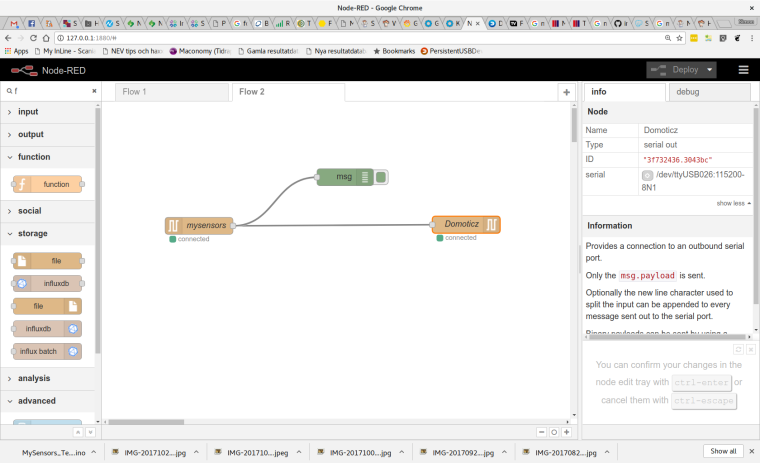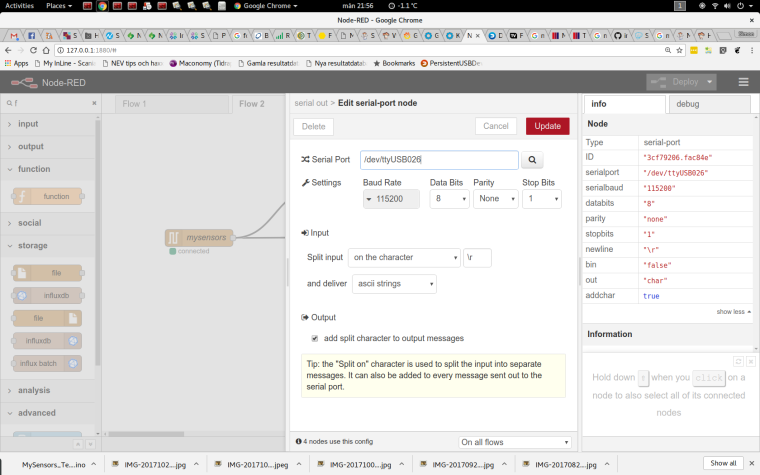How to add a serial device to use in node-red
-
I have added
socat PTY,link=/dev/ttyS81,mode=666,group=dialout,raw PTY,link=/dev/ttyUSB026,mode=666,group=dialout,raw &to /etc/rc.local
pi@Host-I:~ $ ls -l /dev/ttyU* lrwxrwxrwx 1 root root 10 Mar 13 16:27 /dev/ttyUSB020 -> /dev/pts/1 lrwxrwxrwx 1 root root 10 Mar 13 16:27 /dev/ttyUSB026 -> /dev/pts/3On /dev/ttyUSB020 I have my NRF24 module connected and Domoticz and use it with no issues. I want to bring Nod-Red into the equation so I created /dev/ttyUSB026
for some reason I cant connect Node-Red to /dev/ttyUSB020
Node-Red keeps saying
Error: Permission denied, cannot open /dev/ttyUSB020@hiddenuser I know this is really late but I just ran into this problem and thought I'd post the solution in case any other people run into it. Thanks go to @mfalkvidd for providing the solution. You need to add this line:
sudo chmod 666 /dev/ttyUSB020to /etc/rc.local
Here is a link on how to do that (and for more info): https://www.raspberrypi.org/documentation/linux/usage/rc-local.md
-
@hiddenuser I know this is really late but I just ran into this problem and thought I'd post the solution in case any other people run into it. Thanks go to @mfalkvidd for providing the solution. You need to add this line:
sudo chmod 666 /dev/ttyUSB020to /etc/rc.local
Here is a link on how to do that (and for more info): https://www.raspberrypi.org/documentation/linux/usage/rc-local.md
@petewill Thanks Pete!!! .. I shall give it a try.
-
The correct method is to add the user running node-red to the correct group on the system.. Probably the dialout group.
try
ls -l /dev/ttyUSB*And note the group / user that is allowed to use the port. (as mentioned earlier, the group is probably dialout)
then issue the following command:
sudo usermod -a -G dialout <userName that node-red runs under>then restart your rpi/computer/(whatever you are running on :))
Now you should have access to the ttyUSB20.
(I do not have access to a linux box right now, so I can not make screenshots / shell dumps of actual displayed data.. Can do this later today, when I'm at my private machine)
-
The correct method is to add the user running node-red to the correct group on the system.. Probably the dialout group.
try
ls -l /dev/ttyUSB*And note the group / user that is allowed to use the port. (as mentioned earlier, the group is probably dialout)
then issue the following command:
sudo usermod -a -G dialout <userName that node-red runs under>then restart your rpi/computer/(whatever you are running on :))
Now you should have access to the ttyUSB20.
(I do not have access to a linux box right now, so I can not make screenshots / shell dumps of actual displayed data.. Can do this later today, when I'm at my private machine)
@tbowmo Thanks! I just had a chance to go through this. I ran the command and looks like root has access?
pi@rpi:~ $ lrwxrwxrwx 1 root root 10 Nov 8 21:07 /dev/ttyUSB020 -> /dev/pts/1Also it appears that my user that I think is running node-red (still called pi) already has access to the dialout group?
pi@rpi:~ $ awk -F':' '/dialout/{print $4}' /etc/group pi -
when you run socat, you specify access rights with the mode option, which is set to 666.. So USB20 should already be read/writeable by all..
The original problem by @hiddenuser was the "real" serialport for the arduino, which should help with the adding the user to dialout group.
Normally you have to add your own user to the dialout group, as it is not added per default..
-
when you run socat, you specify access rights with the mode option, which is set to 666.. So USB20 should already be read/writeable by all..
The original problem by @hiddenuser was the "real" serialport for the arduino, which should help with the adding the user to dialout group.
Normally you have to add your own user to the dialout group, as it is not added per default..
-
I thought that it should be quite easy to use Node-red but I struggle with it and especially the serial port.
I have created a passive node:
// Enable debug prints #define MY_DEBUG #define MY_GATEWAY_SERIAL // Enable passive mode #define MY_PASSIVE_NODE #define MY_REPEATER_FEATURE // Passive mode requires static node ID #define MY_NODE_ID 0 // Enable and select radio type attached // #define MY_RADIO_NRF24 //#define MY_RF24_PA_LEVEL RF24_PA_HIGH //#define MY_RADIO_NRF5_ESB //#define MY_RADIO_RFM69 //#define MY_RADIO_RFM95 #include <MySensors.h> #define CHILD_ID_HUM 0 #define CHILD_ID_TEMP 1 #define CHILD_ID_BINARY 2 // Initialize general message MyMessage msgTemp(CHILD_ID_TEMP, V_TEMP); MyMessage msgHum(CHILD_ID_HUM, V_HUM); MyMessage msgBinary(CHILD_ID_BINARY, V_STATUS); int counter = 0; float temperature = 0; float humidity = 0; int binary = 0; void setup() { } void presentation() { // Send the sketch version information to the gateway and controller sendSketchInfo("Passive node", "1.0"); // Register all sensors to gw (they will be created as child devices) present(CHILD_ID_TEMP, S_TEMP); present(CHILD_ID_HUM, S_HUM); present(CHILD_ID_BINARY, S_BINARY); } void loop() { // generate some random data counter ++; if (counter == 20 ){ temperature = 0; humidity = 0; counter = 0; } else { temperature = 25.0 + random(0,30)/10.0; humidity = 55.0 + random(-20,20); } /* if (binary == 0){ send(msgBinary.set(binary,2)); binary = 1; }else { send(msgBinary.set(binary,2)); binary = 0; } */ send(msgTemp.set(temperature,2)); send(msgHum.set(humidity,2)); wait(1000); }To generate some data and I get the data in to Node-Red and can send the data to Influx/Grafana but the output to a socat serial port is strange. I have tested and I got the best result when I use a baudrate of 9600.
When I look to the output data in a terminal a lot of messages are missing or has the format of:
0;1;1;0;0;26.00^J^M0;0;1;0;1;67.00^J^M0;1;1;0;0;27.40^J^M0Have the most simple flow at the moment:


with this properties

sudo socat PTY,link=/dev/ttyS81,mode=666,group=dialout,raw PTY,link=/dev/ttyUSB026,mode=666,group=dialourawHow should I configure the serial output?
-
looks like your socat line is wrong..
It should be
sudo socat PTY,link=/dev/ttyS81,mode=666,group=dialout,raw PTY,link=/dev/ttyUSB026,mode=666,group=dialout,rawAlso, try and connect node-red to ttyS81 instead, as it's the "source". (probably doesn't matter much, but it makes more sense to me :) )
-
Hi,
I had the same problem: I have a serial GW on the PI that outputs data on /tty/USB20, and is used by Domoticz.
I want to test MQTT via node-red, so I need to read this serial port from node-red.
I tried:
sudo socat PTY,link=/dev/ttyS81,mode=666,group=dialout,raw PTY,link=/dev/ttyUSB20,mode=666,group=dialout,rawBut nothing appears on ttyS81: I tried with
sudo screen /dev/ttyS81 115200and of course on node-red, I set up a node that reads from ttyS81 and outputs to debug: the serial port is opened successfully, but nothing appears on debug.
If I use
sudo screen /dev/ttyUSB20 115200I can see some data coming
I'm no expert with socat (I learned its existence via this forum post), so any help is appreciated.
Thanks,
Stephan -
is /dev/ttyUSB20 your gateway device?
What I have done, is the following:
/dev/tty<gateway> <- nodered is connected to this one directly
then I have socat create a dummy set of serial ports
/dev/ttyS81 -> /dev/ttyUSB21Nodered connects to /dev/ttyS81 and domoticz connects to /dev/ttyUSB21
Now nodered is in the middle, between the gateway and your domoticz instance. You then need to create a flow in nodered, that moves data from your gateway, to domoticz, and vice versa. Start with a simple flow, that just connects input serial node, to an output serial node, and then build up on that.
Haven't got access to my nodered installation at the moment, so can't make any screenshots..
-
I tried (/dev/ttyUSB20 being the port used and created by the MySensors Gateway):
sudo socat PTY,link=/dev/ttyUSB21,mode=666,group=dialout,raw PTY,link=/dev/ttyUSB20,mode=666,group=dialout,raw(I found that Domoticz needs the port to be ttyUSB*).
I connected Domoticz to a MySensors Gateway USB on port /dev/ttyUSB21
And Node-RED to /dev/ttyUSB20But nothing worked: Domoticz did not see new data arrive and Node-RED didnt receive anything. I tried rebooting (and redo the socat dance), nothing happened.
I suppose my non-understanding of socat is the main cause of this failure.
So, I took the plunge and moved to a MySensors MQTT gateway. I had to reflash my sensors with a fixed unit_id (not sure if it's still a requirement), and voila.
Now I can play with Node-RED and try other controllers in parallel of Domoticz.
Thanks for the help.
-
here is my solution;
add a new udev rules file for permissions:
sudoedit /etc/udev/rules.d/50-usb-permissions.rulespaste the following in our new rules file:
(it gives all permission to any USB* and ACM* devices)KERNEL=="ttyUSB[0-9]*",MODE="0666" KERNEL=="ttyACM[0-9]*",MODE="0666"that's it. this will give you all the permissions to all usb devices on every boot. also you can reload udev instead of rebooting.
udevadm control --reload-rules
*** please note that this gives permissions to all USB* and ACM* devices.
if you're concerned about security you can add the following so that only the mentioned device will be accessable:
ATTRS{idVendor}=="XXXX", ATTRS{idProduct}=="YYYY"for example, in my case (output from dmesg):
[ 2654.037338] usb 1-1: New USB device found, idVendor=1a86, idProduct=7523 [ 2654.037344] usb 1-1: New USB device strings: Mfr=0, Product=2, SerialNumber=0 [ 2654.037347] usb 1-1: Product: USB2.0-Serial [ 2654.038531] usb 1-1: ch341-uart converter now attached to ttyUSB0so, for me it's:
ATTRS{idVendor}=="1a86", ATTRS{idProduct}=="7523"
